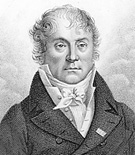
Antoine-Vincent Arnault
Encyclopedia

France
The French Republic , The French Republic , The French Republic , (commonly known as France , is a unitary semi-presidential republic in Western Europe with several overseas territories and islands located on other continents and in the Indian, Pacific, and Atlantic oceans. Metropolitan France...
dramatist.
Arnault was born in Paris
Paris
Paris is the capital and largest city in France, situated on the river Seine, in northern France, at the heart of the Île-de-France region...
. His first play, Marius à Minturne (1791), immediately established his reputation. A year later he followed with a second republican tragedy
Tragedy
Tragedy is a form of art based on human suffering that offers its audience pleasure. While most cultures have developed forms that provoke this paradoxical response, tragedy refers to a specific tradition of drama that has played a unique and important role historically in the self-definition of...
, Lucrèce. Arnault left France during the Reign of Terror
Reign of Terror
The Reign of Terror , also known simply as The Terror , was a period of violence that occurred after the onset of the French Revolution, incited by conflict between rival political factions, the Girondins and the Jacobins, and marked by mass executions of "enemies of...
, but on his return, he was arrested by the revolutionary authorities. He was freed through the intervention of Fabre d'Églantine
Fabre d'Églantine
Philippe François Nazaire Fabre d'Églantine , commonly known as Fabre d'Églantine , was a French actor, dramatist, poet, and politician of the French Revolution.-Early life:He was born in Carcassonne, Aude...
and others. He was commissioned by Napoleon Bonaparte in 1797 with the organization of the Ionian Islands
Ionian Islands
The Ionian Islands are a group of islands in Greece. They are traditionally called the Heptanese, i.e...
, and was nominated to the Institute and made secretary general of the university. Arnault was faithful to his patron through his misfortunes, and after the Hundred Days
Hundred Days
The Hundred Days, sometimes known as the Hundred Days of Napoleon or Napoleon's Hundred Days for specificity, marked the period between Emperor Napoleon I of France's return from exile on Elba to Paris on 20 March 1815 and the second restoration of King Louis XVIII on 8 July 1815...
remained in exile until 1819. Arnault died at Goderville
Goderville
Goderville is a commune in the Seine-Maritime department in the Haute-Normandie region in northern France.-Geography:A farming and light industrial town situated to the south of Fécamp, at the junction of the D10, D925 and D139 roads, in the Pays de Caux....
.
Other plays of Arnault's are: Blanche et Moncassin, ou les Vénitiens (1798); and Germanicus (1816), the performance of which was the occasion of a disturbance in the parterre
Parterre
A parterre is a formal garden construction on a level surface consisting of planting beds, edged in stone or tightly clipped hedging, and gravel paths arranged to form a pleasing, usually symmetrical pattern. Parterres need not have any flowers at all...
which threatened serious political complications. His tragedies are now less well known than his Fables (1813, 1815 and 1826), which are written in graceful verse. Arnault collaborated a Vie politique et militaire de Napoléon 1er (1822), and wrote some very interesting Souvenirs d'un sexagénaire (4 vols, 1833), which contain much out-of-the-way information about the history of the years previous to 1804. Arnault's Œuvres complètes (4 vols.) were published at the Hague and Paris in 1818-9, and again (8 vols.) at Paris in 1824.
Arnault's eldest son, Emilien Lucien (1787-1863), wrote several tragedies, the leading rôles in which were interpreted by Talma.

